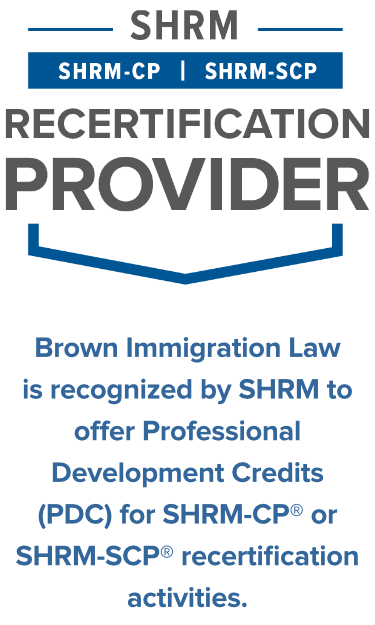On May 29, President Trump issued a proclamation suspending the visa application and entry of Chinese graduate level and higher students (F-1) and researchers (J-1) into the US who are associated with entities in China that implement or support its “military-civil fusion strategy.” Under the proclamation, military-civil fusion strategy means “actions by or at the behest of [China] to acquire and divert foreign technologies, specifically critical and emerging technologies, to incorporate into and advance [China’s] military capabilities.” The proclamation takes effect on June 1, 2020 at 12:00 p.m. EDT.
For Chinse graduate students and researchers already in the U.S., the proclamation directs the Department of State to consider whether it should cancel the visas of individuals already holding a visa who would otherwise have been barred from entering the US.
Like previous proclamations, this proclamation exempts certain individuals including:
- Undergraduate students;
- Lawful permanent residents of the U.S;
- The spouse of a U.S. citizen or lawful permanent resident;
- A foreign national who is a member of the U.S. Armed Forces and any foreign national who is a spouse or child of a member of the U.S. Armed Forces;
- A foreign national whose travel falls within the scope of section 11 of the United Nations Headquarters Agreement (such as a PRC U.N. representative or expert performing a U.N. mission) or who would otherwise be allowed entry into the United States pursuant to United States obligations under applicable international agreements;
- A foreign national who is studying or conducting research in a field involving information that would not contribute to the PRC’s military-civil fusion strategy, as determined by the Secretary of State and the Secretary of Homeland Security, in consultation with the appropriate executive departments and agencies;
- A foreign national whose entry would further United States law enforcement objectives, as determined by the Secretary of State, the Secretary of Homeland Security, or their respective designees, based on a recommendation of the Attorney General or his designee; or
A foreign national whose entry would be in the national interest, as determined by the Secretary of State, the Secretary of Homeland Security, or their respective designees.
The Secretary of State or his designee is directed to establish standards and procedures to identify individuals subject to this proclamation. As a result, we can expect increased scrutiny for F and J visa applicants.
In addition, within 60 days of the proclamation taking effect, the Secretary of State and the Secretary of Homeland Security are required, in consultation with the heads of the appropriate agencies, to review nonimmigrant and immigrant programs to make recommendations for any other measures requiring additional Presidential action.
This proclamation comes at a time when the President is expected to announce additional action restricting the issuance of temporary nonimmigrant visas. In the meantime, we will continue to work with clients to ensure that cases are filed as soon as practicable. Please contact a member of our legal team if you may be impacted by this proclamation or have concerns regarding the impact of potential additional presidential action. We will continue to provide updates regarding any new restrictions. We will continue to provide updates regarding any new restrictions, and as soon as we have word on any new Nonimmigrant Proclamation impacting other visa status types, we will schedule a new round of webinars to ensure client questions are answered.
USCIS Announces Phased Resumption of Premium Processing for Certain Petitions
On May 29, USCIS announced that it will resume premium processing in phases for the month of June:
- June 1: USCIS will accept premium processing for all eligible I-140 petitions.
- June 8: USCIS will accept premium processing upgrades for all pending cap-exempt H-1B petitions and all other non-H-1B nonimmigrant petitions filed before June 8.
- June 15: USCIS plans on accepting premium processing requests with concurrently filed (or filed on or after June 8) H-1B cap-exempt petitions or cap-exempt petitions based on a Conrad/IGA waiver.
- June 22: USCIS plans on resuming premium processing for all other Form I-129 petitions including all H-1B cap-subject petitions and all other Form I-129 petitions for nonimmigrant classifications eligible for premium processing.
Our firm will work with employers and employees at each stage of the phase-in to identify cases that may qualify for premium processing. We will provide further updates regarding premium processing availability in the event that USCIS revises the timeline.
US Adds Brazil to COVID-19 Travel Ban List
On May 24, President Trump signed a fifth proclamation suspending the entry into the U.S. of all immigrants and nonimmigrants who were physically present in Brazil within 14 days preceding their entry or attempted entry into the U.S due to the ongoing COVID-19 pandemic. Brazil joins a list of countries with similar restrictions which include: China (excluding the Special Administrative Regions of Hong Kong and Macau), Iran, the Schengen Area, the United Kingdom (excluding overseas territories outside of Europe), and Ireland. Similar to the prior COVID-19 travel ban proclamations, the ban does not apply to U.S. citizens, U.S. permanent residents, and provides for other limited exceptions. The new travel restriction was initially scheduled to take effect on May 28, but an amendment revised the effective date to May 26 at 11:59 pm EDT.
Best Regards,
The Team at Brown Immigration Law
** This newsletter/memo is provided for informational and discussion purposes only. It does not act as a substitute for direct legal contact on an individual basis **



